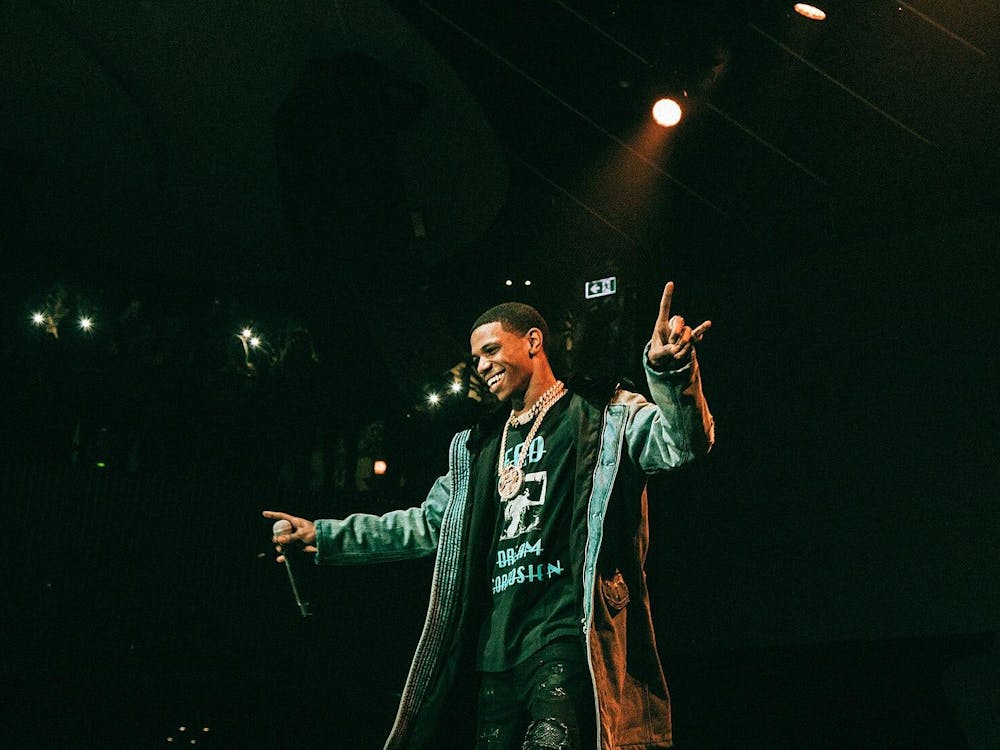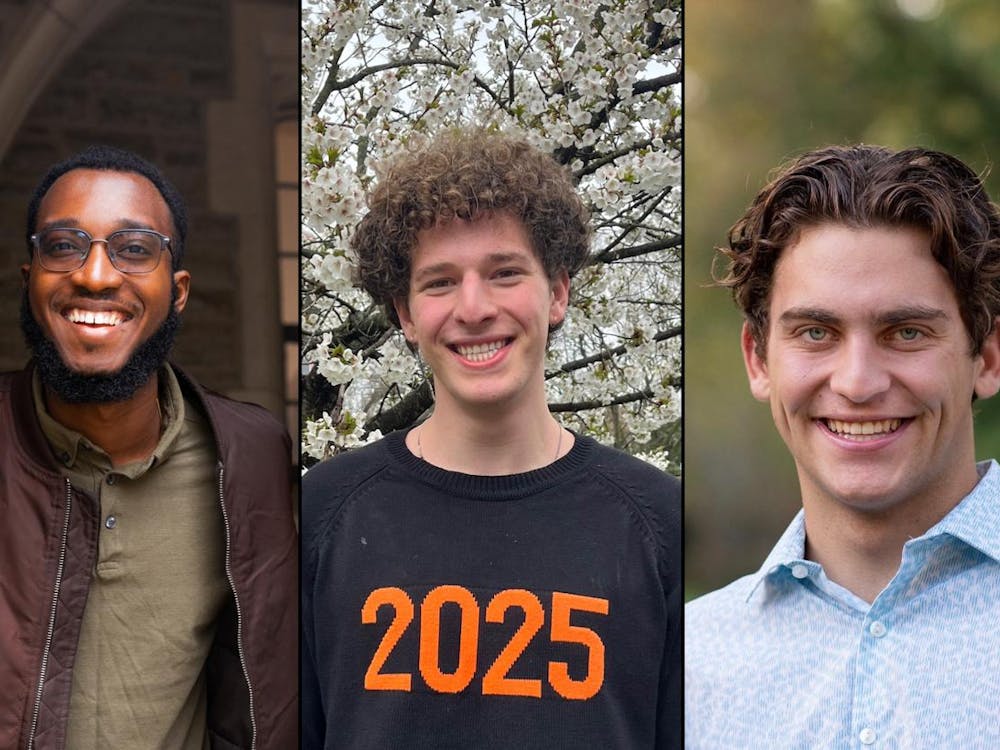Hida Viloria, a Latinx intersex writer and activist, gave a lecture titled "'Sex' is Complicated: Intersectionality and Intersex Human Rights, Identity, and Discourse" on Thursday. S/he is also the author of "Born Both," which will be published in 2017. Viloria sat down with The Daily Princetonian immediately following the lecture to talk about he/r lifelong work as an intersex advocate.
The Daily Princetonian:To start off, you were talking about how many intersex infants are subject to surgeries to change their identity to become either male or female. Could you tell me a little bit more about this surgery, what indicators make doctors and parents decide to do it, and your thoughts on parents deciding to do it?
Hida Viloria: Sure. Typically, ambiguous genitalia are the first thing that will tip off a parent. There are other ways to detect certain variations in utero as well, but if a baby is born with the body, and it will be a phallus, which is the gender-neutral term. So, either a clitoris that is considered too large or a penis that is considered too small — this sets off the alarms. “How do we gender this child? How do we sex this child, more specifically?” Sex of the baby has immediate gender implications, right? That’s why in first world countries, where sexism isn’t as strong, it’s considered okay to make the baby a female.
But in third world countries, where sexism is stronger, we find that they actually do procedures to try to raise the baby as male. So that happens. And, typically, I feel that parents are very vulnerable after birth. I know this from knowing many parents now as I’ve gotten older. They are tired. They’ve been nervous. It’s scary to give birth in general, and that moment when it’s done is that moment they’ve been waiting for nine months. So, if they’re presented with something negative at that time, it has a really, stronger than usual, impact.
And language has such a strong impact. A simple change in language on how an intersex birth is presented could make all the difference. I feel that all a doctor would need to say is, “You have a healthy baby. They are born with a variance in sex characteristics.” And the parents would go, “What do you mean, a variance in sex characteristics?” “Well, their genitals have a variance. It’s common. It’s as common as having red hair. There are many different options.”
We’ve found that adults can grow up very healthy and normal with genital variance. I personally would not recommend the surgery, but just knowing the way that medicine is right now, and even with the advent of surgeries becoming more popular because of the trans community, I feel that people would want to present that option more. And so you could say, “There is the possibility of altering the genitals. However, there are very serious health risks involved. We recommend not doing that because you don’t know, nobody knows, what gender their child is going to grow up. We recommend letting them grow up with the body they have. They appear to be more male than female.” And so, I just feel like it could easily be presented in a way that would calm parents down rather than create chaos and worry and fears about their future. So I think that’s really what happens to parents. If a doctor says there is something wrong with them, and from what I’ve heard from all the parents I speak to, who are being told there is something wrong with their child, they’re not doctors, they don’t know.
And unlike my family, where my father was a doctor so they had to be very honest with him, and he also had his own medical knowledge to know what would be best for me, most parents are completely dependent on their doctors’ opinions. Most people, actually, especially people from low socioeconomic backgrounds, don’t even get second opinions.
So they are really completely vulnerable to whatever the doctor recommends, and I’ve heard so many stories of parents whose gut told them not to do it, but they were slowly convinced to do it and so I think that’s really what happens. I think that as parents become more educated, we are going to see a steep decline. We already see a steep decline in circumcision which has none of the extreme negative health impacts and that’s already about 50-50 apparently, according to some recent reports, in terms of people not circumcising anymore. It’s just about education that that happened. So I think the same thing would happen but I think we really need visibility because if there is not an adult, visible intersex community, parents will feel like, what can their child grow up to be? I think that’s probably the biggest obstacle for parents. It used to be the biggest obstacle for parents of gay and lesbian children. There just wasn’t a way to be an open gay or lesbian person, so if their child was gay or lesbian it was like, we have to hide that. We are now facing that same kind of treatment.”
DP: So in the media and today’s society, the terms “intersex” and “genderqueer” are often used almost interchangeably. How would you relate these two terms?
HV: Well I think there’s a huge connection between the genderqueer community and the intersex community. I actually personally don’t see them connected as often as I would like, but I just think it’s important to constantly be clear and I think that when things are presented clearly, people are actually able to understand them. For example, people are able to grasp the difference between trans and LGB people even though they’re part of the same acronym. We’ve been able to easily understand that there are different issues involved.
So I think in the same way people can understand that intersex means you are born with certain physical characteristics and your gender identity will develop into whatever it develops into. Genderqueer means specifically that it doesn’t necessitate being intersex.

DP: What would you say that your sexuality has taught you about your life thus far?
HV: Wow, [laughs] that’s a big-time question. How do I give you a concise answer…well, I can think of a few things…my sexuality has taught me that people are actually a lot more open-minded and accepting than we often portray them to be. Bottom line. I’ve had almost no negative reactions to my very noticeably ambiguous genitalia. And in fact, I would say that it’s enhanced my sex life. And my long-term friends of many decades wouldn’t have said the same. They’ve actually told me before I met my partner that my biggest problem was that too many people were attracted to me. Because being intersex meant for me — and obviously not all intersex people — but because of my androgynous gender presentation, I would have men and women and all sorts of people attracted to me. And I’m very open-minded, so it became very difficult for me to choose. So what I would honestly say is that people just fall in love with people. The best thing is if the person they fall in love with can enjoy sexual relations with them. So that’s not going to happen if the person has had their sexual capacity diminished.
DP: What do you believe that you need to be best supported in this society, and in addition to that, in what ways can Princeton specifically and other Universities address “interphobia” and other connected forms of discrimination?
HV: I think we need additional materials and dialogue to be constantly utilized. I know that it’s harder, but we see for example a lot of Scandinavian countries that have had a lot of progress with issues of sexism and homophobia. But people that I know from these countries argue that it’s easier because it’s such a homogenous society. Until recently they have not been dealing with too many issues of ethnic diversity, so in a way they can just focus on this one issue. So it is easier to be a homogenous culture, but I would argue it’s a less rich culture than one that embraces diversity. And I think that humans are intelligent enough to really embrace and acknowledge all humans. I don’t think we have to erase certain identities.
DP: So, I’m aware that you’re the author of “Born Both,” to be released in 2017. Would you be able to explain just a little of what your book is about?
HV: It’s mainly about my journey to embrace an identity that isn’t supposed to exist and I wasn’t supposed to be. And throughout that journey there’s a lot that gets revealed about sexuality, about gender identity, about how people from marginalized communities can exist in a very healthy and successful way. And that’s the short of it. I’m very excited for it to come out!
DP: Absolutely, that is so exciting! So do you have any other comments that you would like students to know?
HV: Sure, I guess to reiterate what I said in the lecture, I would like students to make sure to mention intersex people every time they talk about sex and gender. I don’t think the words “male” or “female” or “man” or “woman” should ever be uttered without including intersex people in that conversation. And I think just by simply doing that, students can be involved in changing the world and helping societies currently most oppressed in visible communities.







